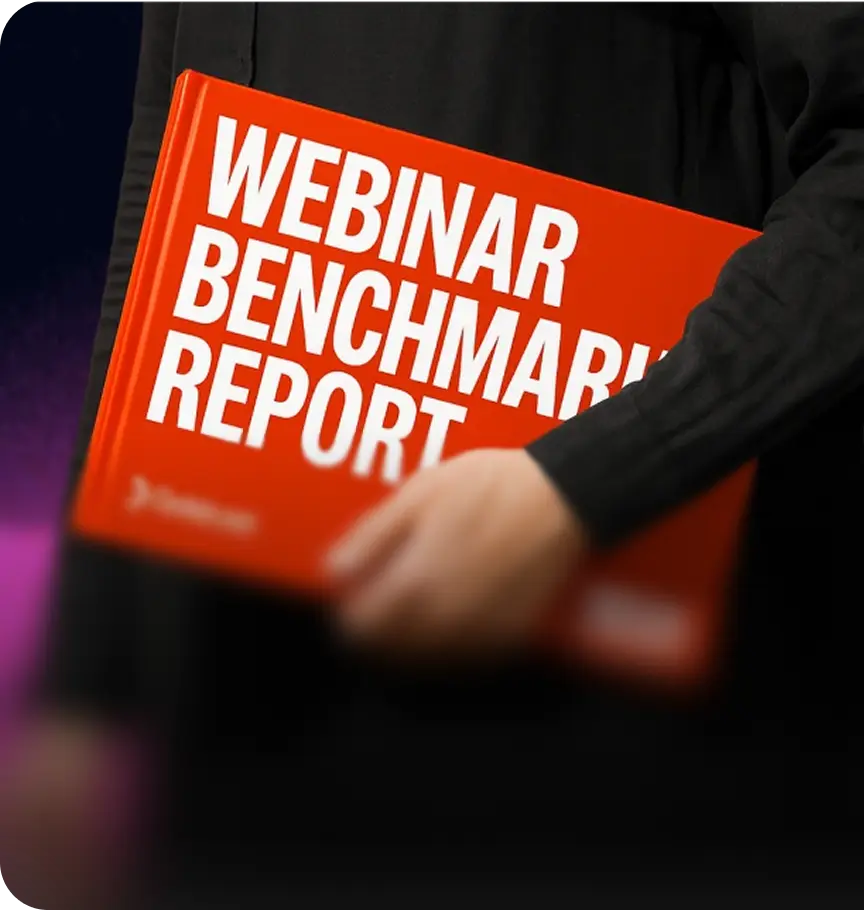Top 20 Event Marketing Professionals to Watch in 2022
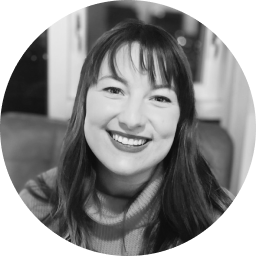
Maximize Your Marketing ROI
Join 10,000 other marketers already getting the best tips on running engaging events that boost pipeline and create raving fans.
More than “just” event planners, modern event professionals are true rockstars of the B2B marketing world. They bring experiences to life that convert leads to customers, customers to advocates, and advocates to communities.
Without further ado, meet the top 20 Event Marketers to watch in 2022!
Libby Billé, Senior Manager of Marketing Events at PubMatic
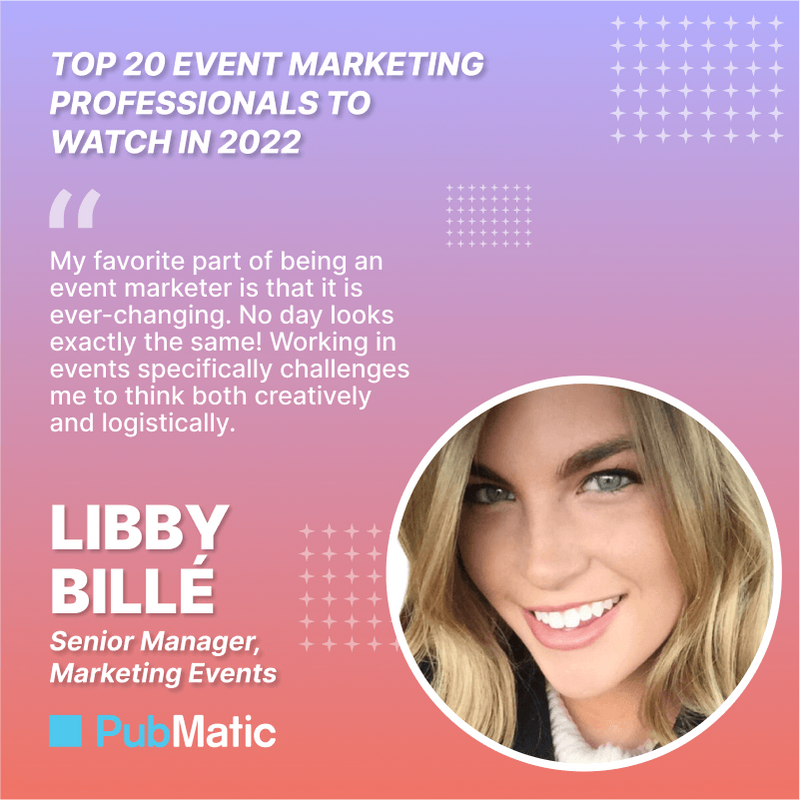
How did you get into event marketing?
When I first chose marketing as my major, I honestly had no idea what I wanted to do or what it meant to be a marketer.
No offense to my university, but to this day, I still don't feel like I've used any of those traditional marketing lessons they tried to drill into our heads. Instead, I miraculously landed a media training job at a major agency and learned the hard way that marketing is not always as glamorous as they make it out to be in “Mad Men.” It was actually a lot of data, analytics, and number crunching. I enjoyed the data analytics, but I was starving for something even slightly more creative.
I eventually switched from a media buying team onto a business development/pitch team, which was way more interesting. They treated each multi-million dollar media pitch like a custom event. Every decision, from decor to food served during the meeting, was extremely strategic. I loved it. I realized that I naturally gravitated towards the event aspects way more than the media content being pitched.
From there, I eventually moved into my current role at PubMatic, which is totally dedicated to event marketing and planning. A perfect balance of data-powered decision-making melted with creative event planning!
What’s your prediction for the future of events?
If we have learned anything over the past two years, it’s that making predictions can feel somewhat useless. Curveballs like a global pandemic have thrown tried and true practices and strategies out the door!
What I can say is this: the pandemic has created a new standard of accessibility. Meaning people have now gotten comfortable being given the option to make informed decisions about their health and individual willingness to attend a large in-person event.
Before, traveling across the country to attend in-person events was the standard. Early pandemic attendees quickly adapted and became open to virtual events.
However, given the current state, I predict that attendees will now EXPECT to still be given a choice to register in person or have some type of live streaming or post-event recording access.
They will actively seek out these hybrid options and find it odd or an oversight if a virtual option is not given.
Drew Bush, Senior Event Marketing Manager at Propel
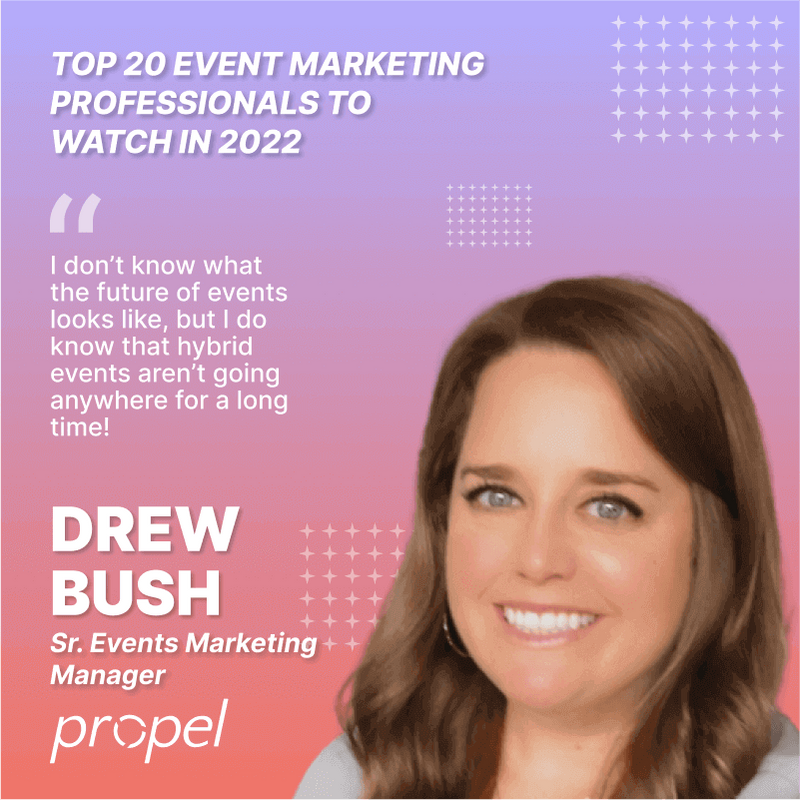
How did you get to this point in your career?
Growing up, I loved helping run birthday parties at the large sports complex my mom worked at. As I got older, I helped with sanctioned tennis tournaments and socials.
Flash forward to finishing my degree, and I land my first full-time job in event marketing for a classic car show company. It was 100% grassroots – dropping posters and flyers door-to-door to promote the events.
After four years of learning the basics, I was fortunate to land a role in retail technology as an events manager. This is where I found my sweet spot in my career: events, engagement, and experiences!
In 2020 I had a ‘break’ from work when COVID hit (like many others in the industry). A great friend of mine led the demand generation team at Propel and reached out about their events program. I jumped at the chance to run their first annual event, albeit virtually.
Talk about a massive learning curve! I had 30 days to figure out a new company, new event, new concept, and new platform. With everything I learned and the events world continuing to evolve throughout the pandemic, I have helped Propel create best practices for engagements and experiences.
What does your event strategy look like this year?
Our team is more than ready to get boots on the ground and help create pipeline!
As Q2 approaches, we will likely have a mix of events on the calendar. We have learned that some of our attendees simply like that they do not have to travel anymore, whereas some are just waiting for the invite to attend a real happy hour or lunch and learn.
I don’t know what the future of events looks like, but I do know that hybrid events aren’t going anywhere for a long time!
Srishti Choudhury, Senior Manager of Events at CEIPAL
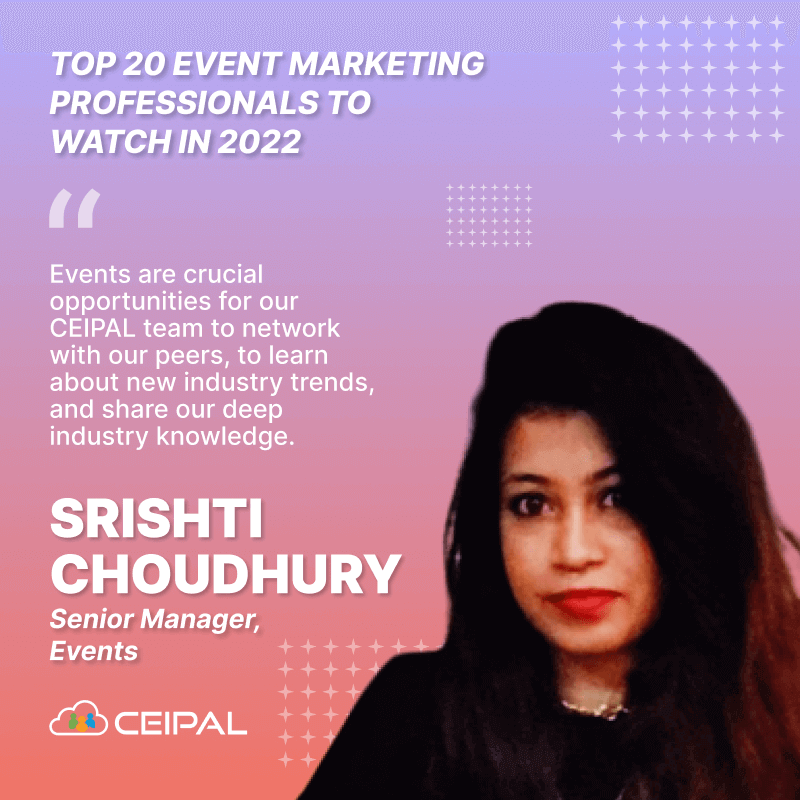
How did you get into event marketing?
I have been part of the events industry for more than eight years now. Over the years, I worked on multiple types of events, including conferences, product launches, weddings, live music, and even awards shows.
I have been fortunate enough to see the growth and transformation within the events industry. I continued being a part of the conference space because it was beyond just “glitz and glamour.” It gave me the opportunity to meet real changemakers and industry stalwarts and gain experience along the way.
What’s your favorite part about working in events?
Many things make working in events fun and exhilarating.
First, there is never a dull moment. Every experience counts, and the learning never stops.
Second, the event space is very dynamic, which keeps the thrill alive. The energy and butterflies in your stomach before every event always feel the same— whether it’s your first or fiftieth.
Mandy Darnell, Director of Event Marketing at Starburst
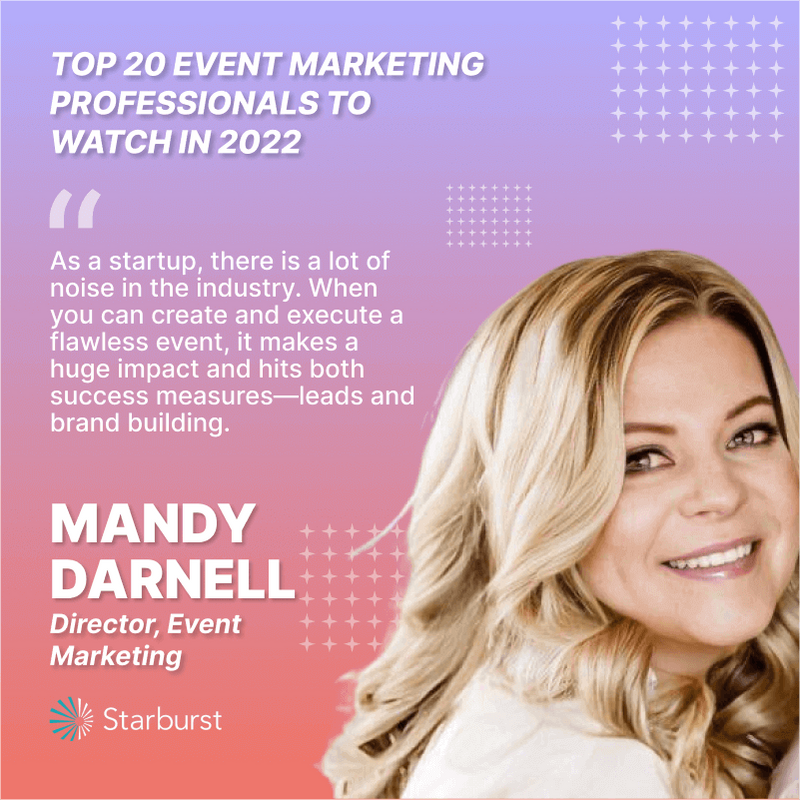
How did you get to this point in your career?
I started out working in non-profits at the Reeve Foundation and Girl Scouts of America. When you work at a non-profit, you wear ALL the hats!
I was able to get great experience from working on websites to donor campaigns and, of course, events. I really fell in love with everything about events, from creating the event project plan to executing all the logistics and then hosting the event and watching everything come together for a successful event.
Once I found my niche, I decided to move into the tech space and found my career doing events and field marketing at a cyber-security company, Rapid7.
After establishing myself at Rapid7, I found my way to Starburst Data, where I was the second marketer hired. I was able to build our event and field marketing program from scratch, which has been a blast!
Why are events important to your overall marketing strategy?
Events are not just top-of-funnel leads; they are also huge for building our brand. As a startup, there is a lot of noise in the industry, and when you can create and execute a flawless event, it makes a huge impact and hits both success measures—leads and brand building.
Allison Davis, Head of Events at Benchling
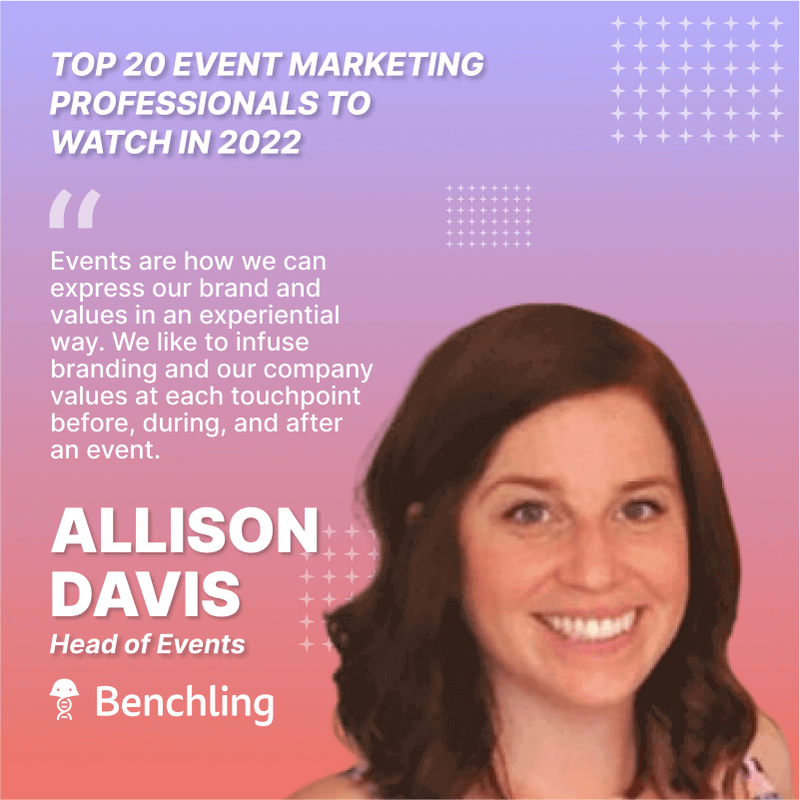
How did you get to this point in your career?
I started my events career as a wedding planner in the Sonoma/Napa area. Because I was young in my career, I still did informational interviews and followed up with connections friends and family made for me.
This is how I landed my first corporate position at Charles Schwab. A family acquaintance was on the marketing team there and brought me in to interview for an Event Marketing position. I was extremely green, but the team took a chance on me, which jump-started my career as a B2B Event Marketer.
Dropbox was a company that I always kept an eye on. The events they were producing were creative and exciting, and they had a great company culture overall. When an events role opened up, I jumped at the chance to move into tech and be part of a fast-growing company.
I was constantly learning at Dropbox, and there was never a dull moment from keeping up with the ever-changing, face-paced environment to supporting events around the world. I was really able to grow both as an event marketer and personally.
Leading an events team during COVID was one of my biggest career challenges to date, and it left me extremely burnt out. I was fortunate to be able to take a six-month hiatus and come back refreshed to start my new role at Benchling.
Since joining Benchling in April 2021, I have been busy building out an event strategy and a team and producing lots of events (both digital and in-person).
What’s your favorite part about working in events?
I love how cross-functional event management is. I am a relationship builder, so I enjoy working with so many people across my organization at every level.
I also love that events are project-based, so you have clear planning cycles, deadlines, and drivers to get the work done. Year over year programs give you the chance to take learnings and new ideas to improve programs each time you do them.
Callum Donnelly, Business Development at Waylay
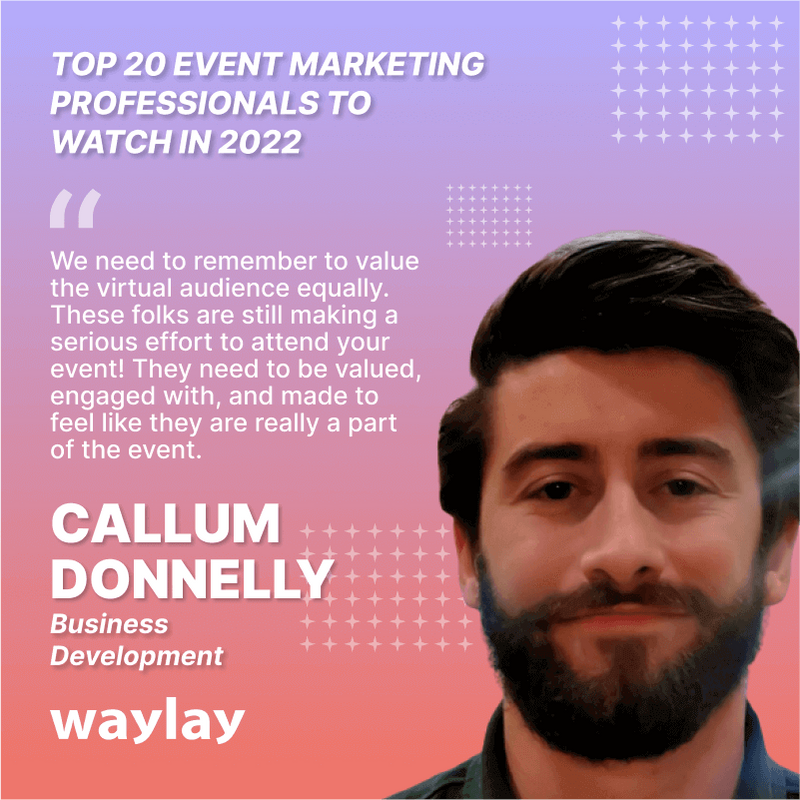
How did you get to this point in your career?
The events side of my career was a complete accident! After graduating from university, I was offered a role as a Business Development Representative with a small group of entrepreneurs and business leaders in my hometown of Skibbereen, Ireland.
Our objective was to create an environment that would support the creation of a start-up ecosystem and retain talent in our area. We created a state-of-the-art Digital Hub to support the initiative and decided to host a technology event to raise awareness.
This is how “National Digital Week” was born. This event quickly grew and, in its first year, attracted tier-one sponsors and huge attendance. It was a novel and unique event that broke expectations and norms.
After this success, I decided to pursue my own entrepreneurial journey before finding my new home at Waylay. Since joining, The Waylay team embarked on two milestones with the release of Waylay IO, our low-code automation platform, and the launch of our own killer event!
What are your predictions for the future of events?
I believe the majority of events will be hybrid events. Customers, leads, and interested parties should have the option to attend in-person or virtually.
We need to remember to value the virtual audience equally. These folks are still making a serious effort to attend your event! They need to be valued, engaged with, and made to feel like they are really a part of the event.
If a hybrid event occurs and the virtual audience is ignored, then the event is a waste of everyone's time. These folks likely won’t show up for another event. That's why events need to have attendee engagement features! More than just a chat function, we need to build meaningful interactions virtually and in person!
Jennifer Cummings, Director of Global Event Marketing at Salesloft
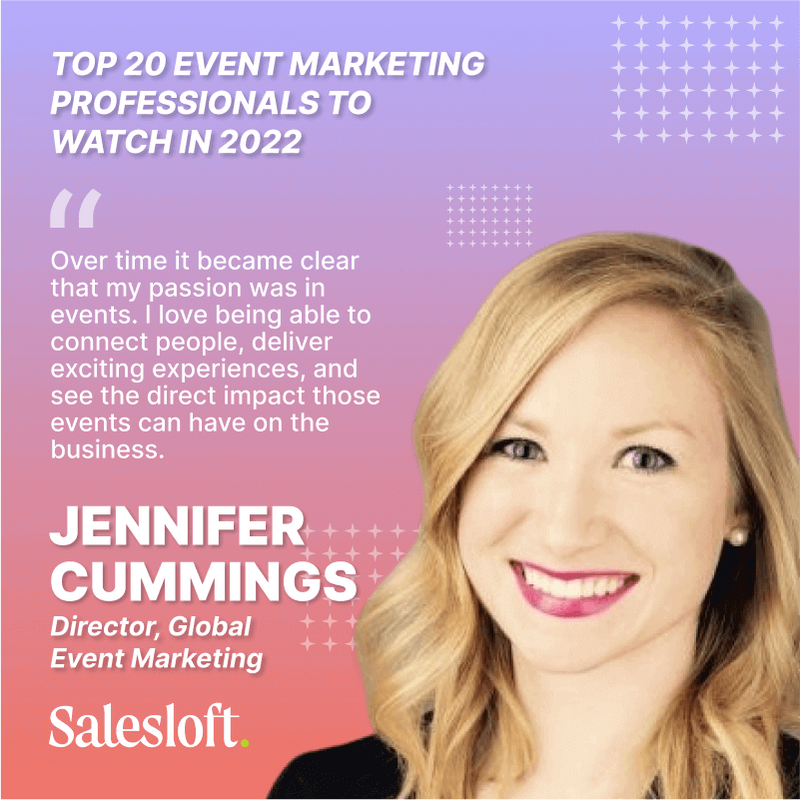
How did you get into event marketing?
I started out as a marketing generalist working on tradeshows, webinars, direct mail, and social media.
Over time it became clear that my passion was in events. I love being able to connect people, deliver exciting experiences, and see the direct impact those events can have on the business.
I’ve worked on events big and small—from tradeshows and seminars to executive roundtables and conferences. Currently, I’m focused on the overall event strategy for Salesloft, including virtual and in-person, and executing major events like our annual conference, Revenue Club, and sales kickoff event.
What does your event strategy look like this year?
We’re excited about the return of our first in-person conference in over three years.
We’re taking a critical look at the event goals and experience to ensure we’ve delivering not just valuable content but strong peer-to-peer connections.
We’re still evaluating hybrid options to ensure we can deliver a thoughtful experience for those who can’t join in person.
For the events we sponsor and participate in, we’re still pursuing virtual events but also moving more budget towards in-person.
My prediction is that we’ll see a strong return to in-person events with some sort of hybrid element to reach as many people as possible. Virtual will continue to be an important way to connect broadly and scalably, but many are craving in-person engagement after two years at home.
Diana Ghigliotti, Event Marketing Manager at Alyce
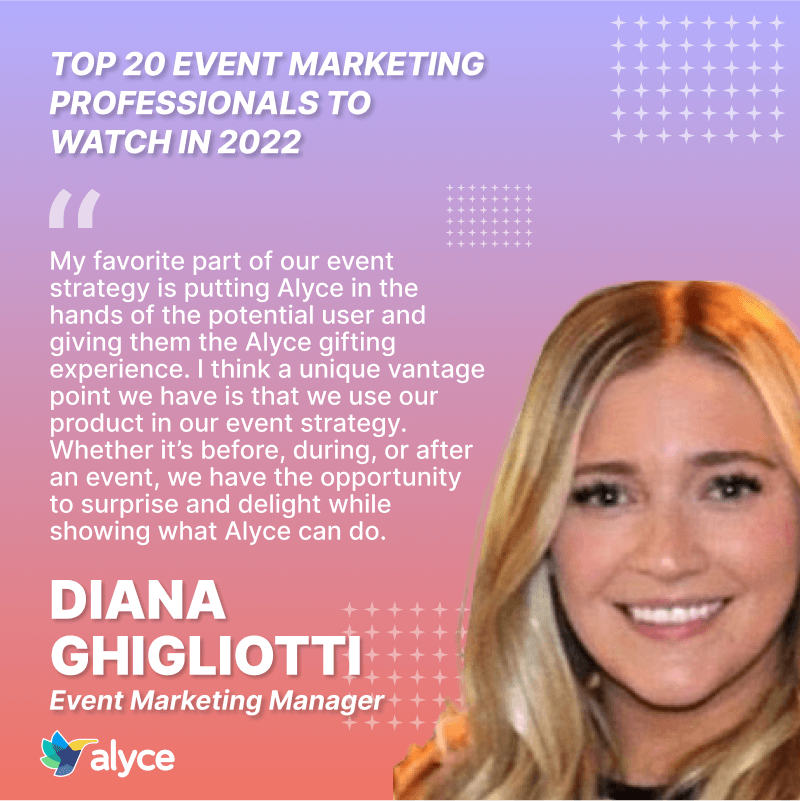
How did you get to this point in your career?
When starting my career, it didn’t take me long to realize that events were a passion of mine.
I started working for the Residences at The Ritz Carlton as a Liaison and was exposed to a few atmospheres that I loved—marketing and events, real estate, and hospitality. Starting in this type of position allowed me to take ownership of and express my creative side. As a team of one, I created events unique to the Residences, such as a Farmer’s Market, an exclusive Restaurant Week, and Holiday Sip & Shops, to name a few.
When it came time for my next venture, I wanted a position and a company that would help me grow and develop the skills needed for a career in events. From there, I worked in various marketing positions, always focusing on events, but ones that allowed me to develop other more generalist skills. During this time, I was fortunate to work for some incredibly talented leaders, one of whom became my mentor.
I have worked across a few different industries over the past few years, always working for small companies and start-ups. To some, job-hopping is viewed in a negative light. Looking back, I was able to gain invaluable insight into so many different environments, solutions, and buyers.
A year into COVID, I wanted to focus on finding a role that allowed me to do what I loved without sacrificing a work/life balance. Finding a genuine atmosphere and a culture that cared about the whole person outside of the 9-to-5 were the most important factors in my search.
Today, I’m celebrating a year at Alyce, where I’m fortunate to have found the work environment I needed while also working with so many talented people.
What does your event strategy look like this year?
Our event strategy looks a little different this year than it has in the past few years.
It has been incredible to be part of in-person events again, but I think virtual and hybrid events will stay.
Each event format serves a different purpose. Virtual is a great format for education but not as great for networking. On the flip side, in-person events are a fantastic way to connect and meet with others, but agendas and work schedules may prevent attendees from getting to each session they want to attend.
What I’m most excited to see are more intimate in-person events. In a smaller environment, you have the opportunity to curate a guest list and create a really unique experience for attendees.
Alicia Gordon, Global Event Marketing at Secure Code Warrior
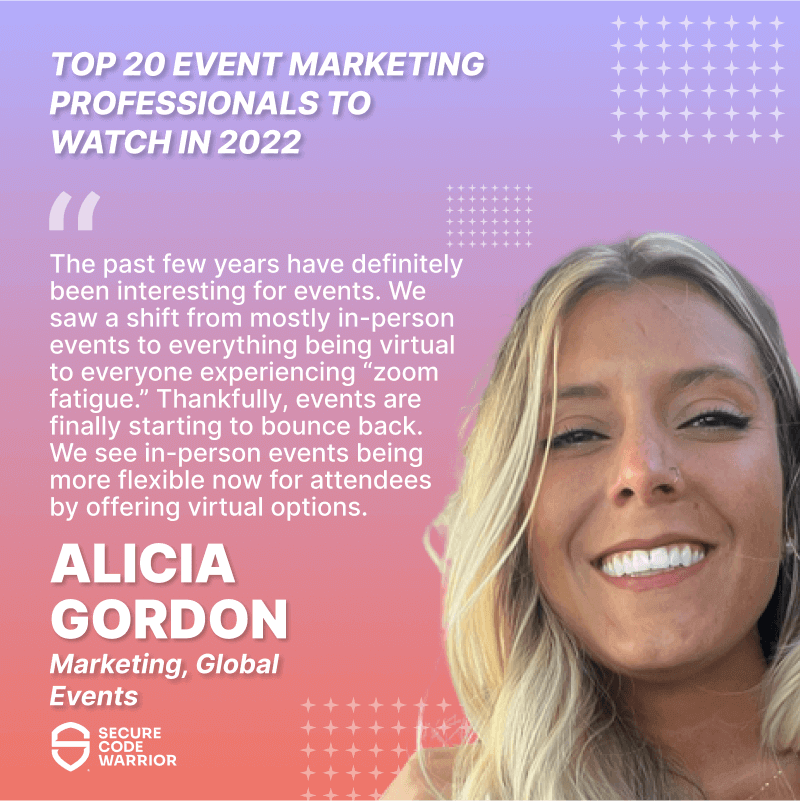
How did you get into event marketing?
After several years in marketing focused on digital marketing, I wanted to try something new. I was looking for something that combined my love for planning things and marketing, and that’s when I decided to make the switch to event marketing. I love that I can merge my marketing knowledge with my attention to detail when planning events in my day to day!
What does your event strategy look like this year?
We are looking at a combination of in-person conferences and webinars. We’re currently working on a Summer Series, which will be a calendar of webinars that will run globally throughout our regions.
The past few years have definitely been interesting for events. We saw a shift from mostly in-person events to everything being virtual to everyone experiencing “zoom fatigue.” Thankfully, events are finally starting to bounce back. We see in-person events being more flexible now for attendees by offering virtual options.
Alexandra Hollon, Field Marketing at Kustomer (Meta)
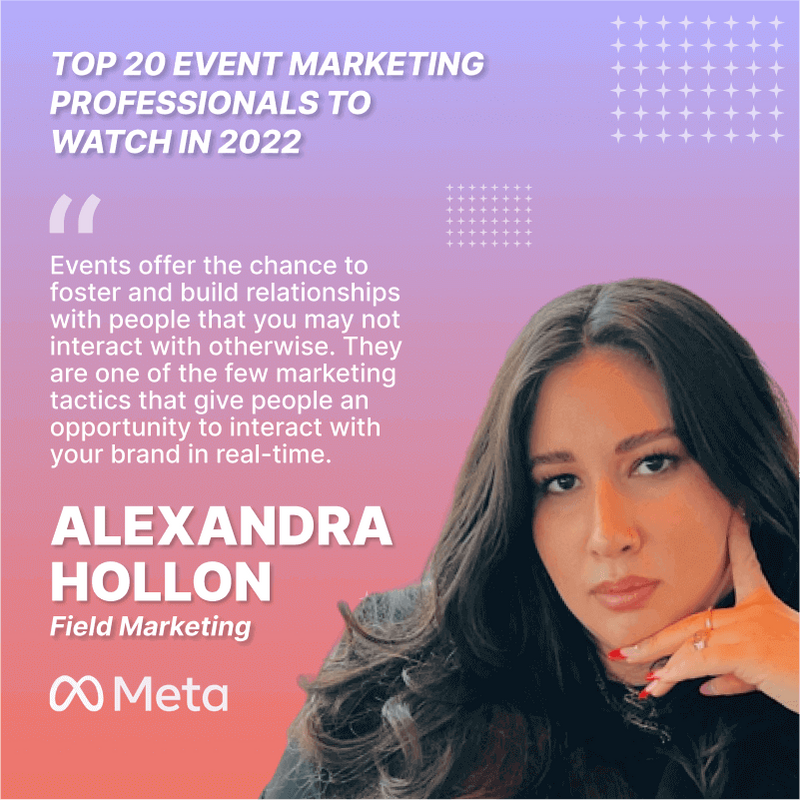
How did you get into event marketing?
I started my career working at a plus-size fashion company, where I had the opportunity to plan internal events and help with a large event that we did yearly during fashion week.
I had an extremely talented mentor there who really guided me into my love for event planning. Something about the organized chaos really speaks to me.
From there, I started to branch into field marketing, specifically in B2B, and the rest is history!
Why are events an important part of your marketing strategy?
So many reasons! Most importantly, it’s a chance to foster and build relationships with people that you may not interact with otherwise. Events are one of the few marketing tactics that give people an opportunity to interact with your brand in real-time. Not to mention the incredible impact it has on brand awareness.
Mark Huber, Head of Brand and Product Marketing at Metadata
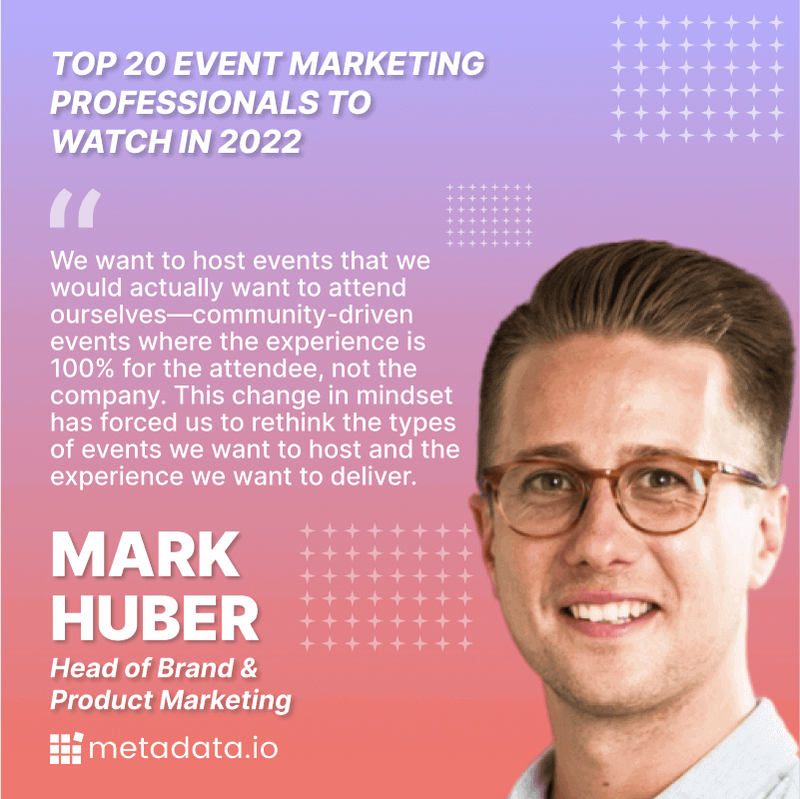
How did you get to this point in your career?
I started in consulting at Accenture Interactive. I then joined a startup B2B marketing agency as a founding member (this is where I started to fall in love with B2B marketing in the nerdiest way possible). Since then, I have bounced around at a few different B2B tech startups over the last five years.
To some, my career path might look very weird: consulting, agency life, marketing operations, demand generation, growth, and finally, brand and product marketing.
It’s also been very intentional from my end. I’ve tried to move into different functions to really round out my marketing experience. My end goal is to become a Chief Marketing Officer.
I’ve always been interested in brand marketing. Ever since I was a little kid, I have been all about brands. I’m admittedly a big Dave Gerhardt fanboy, so I’ve learned a lot from him over the years (from his posts and podcasts). I consider myself incredibly lucky to work with him at Metadata now since he’s an advisor for us.
Why are events an important part of your marketing strategy?
We want to host events that we would actually want to attend ourselves—community-driven events where the experience (virtual or in-person) is 100% for the attendee, not the company.
This change in mindset has forced us to rethink the types of events we want to host and the experience we want to deliver.
Our audience remembers every little detail, the content, and their experience from our events. So we pay a ton of attention to the small things, and it pays off big for our brand.
Dallin Hunt, Digital Event Manager at Weave
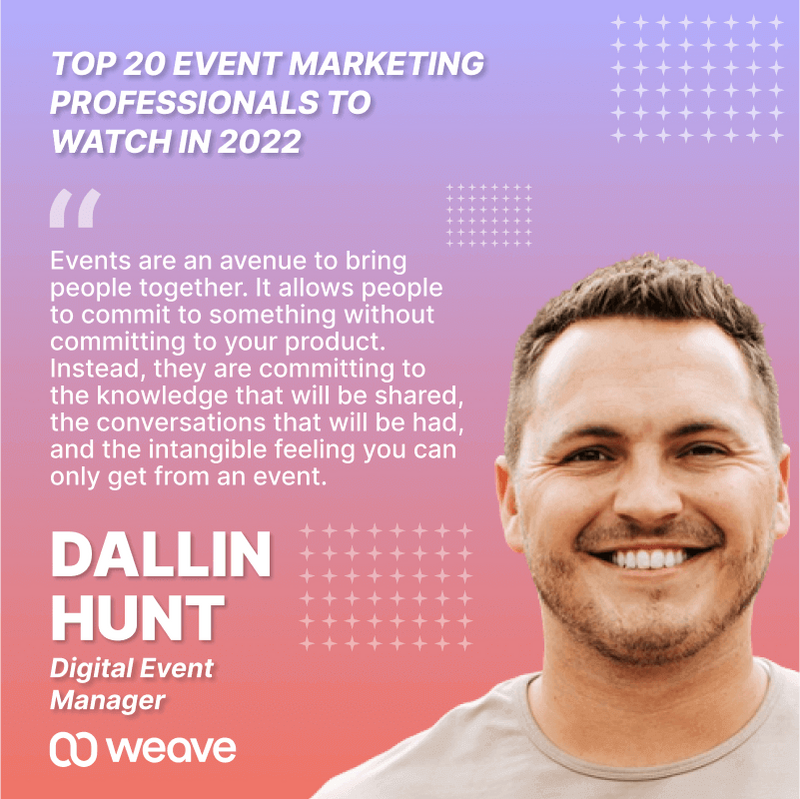
How did you get into event marketing?
While still in college, I took a role as a phone operator for a tech company, Qualtrics. I found I had a lot of spare time in that role, so I worked my way into helping the marketing and events team with various projects on small and large events.
I eventually turned that project work into an internship, which turned into a full-time role, and found that I loved being part of this world. During my time at Qualtrics, I managed both digital and physical events and found that I loved working on both sides.
I’ve turned that into a career now, and I see myself not necessarily as an Event Marketer but more of an experience creator. I currently work at Weave as their Head of Digital Events (with the flexibility to still work on the large-scale physical event side as well), creating amazing experiences for customers and prospects.
Why are events important to your overall marketing strategy?
I find events crucial to any marketing strategy because they provide a bridge between standard marketing content and full-on engagement with sales.
Ebooks, blog posts, one-pagers, etc., are all great in their own way, but they can’t facilitate an environment and feeling like events can.
Events are an avenue to bring people together. It allows people to commit to something without committing to your product. Instead, they are committing to the knowledge that will be shared, the conversations that will be had, and the intangible feeling you can only get from an event.
It provides the perfect foot in the door for us as marketers to become real people and not just words hidden behind all the other assets/efforts we have to reach these people.
Sara Lieber, Event Marketing Manager at Drift
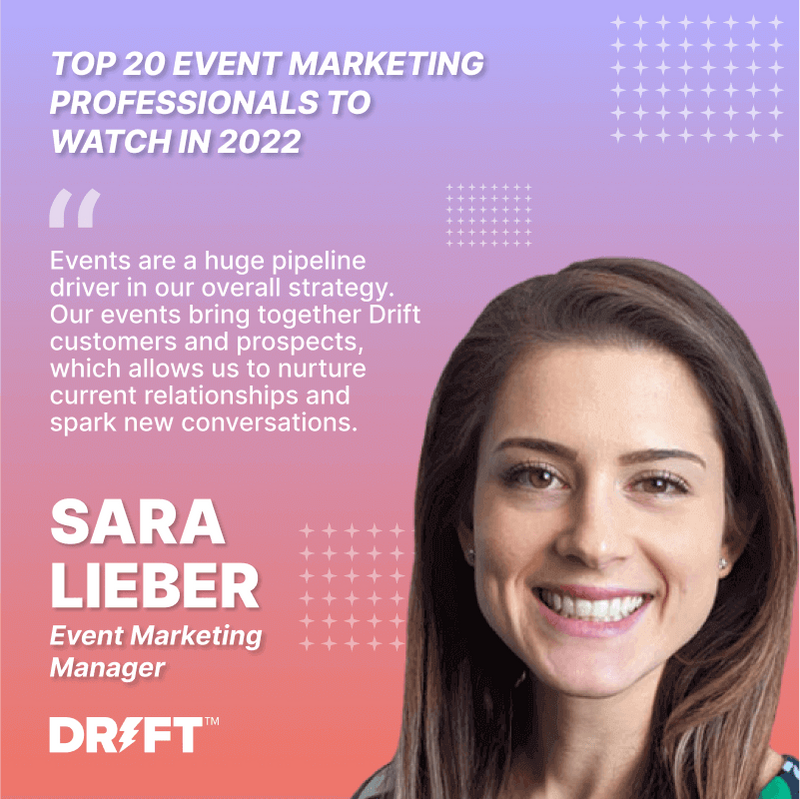
How did you get into events?
I went to school for Hospitality Administration Management and always loved event planning. I started my career with a Boston-based restaurant group during college, working in many positions among their establishments.
When I graduated, I transitioned to the corporate office working in private dining and marketing events for the whole group.
When I left the restaurant industry, I took a leap into the events world, working at an event agency and working with an array of clients managing their large conferences, most of which were in the SaaS space.
Fast forward to today, where my event experience has led me to the position of Event Marketing Manager at Drift!
What’s your favorite part of working in events?
Field and Event Marketing gives me the ability to be creative and think outside the box when it comes to events. There is always an opportunity to change your event format, target different audiences, and provide unique and memorable experiences.
While our events team is a separate department, we get the support of the whole marketing team to brainstorm, discuss ideas, and work together to put on amazing events.
Gabriela Melak, Head of Field Marketing at Coherent
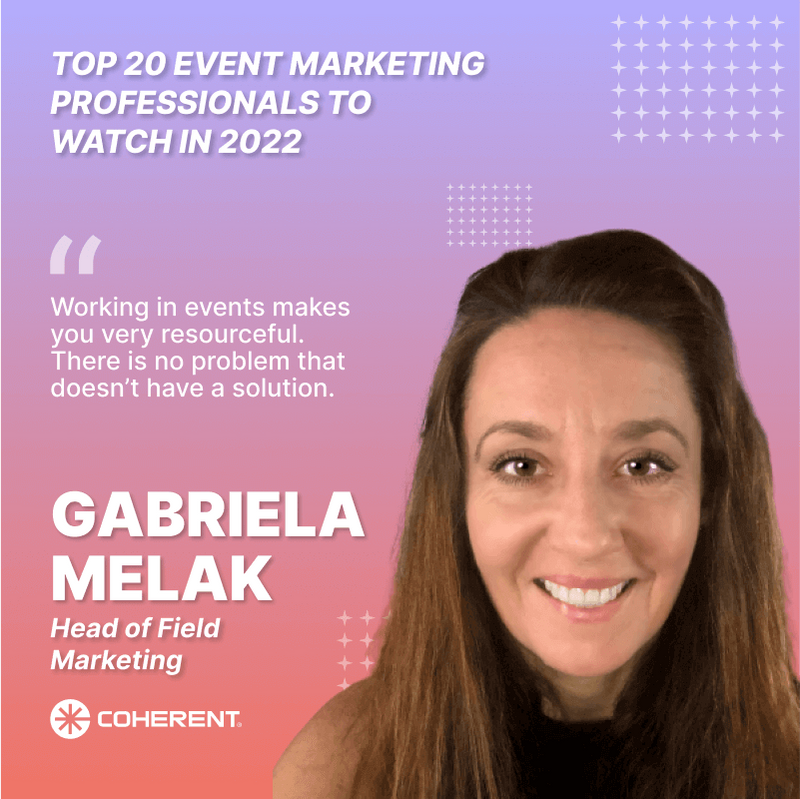
What’s your favorite part of working in events?
I love how fast-paced events are. They tap into your creative side and make you an excellent troubleshooter. You need to have a creative vision and a certain type of stamina to ensure that no matter what, the show goes on. Working in events makes you very resourceful. There is no problem that doesn’t have a solution.
I also love the team component of it. Events are a team sport, and I’m very lucky to be surrounded by some exceptional people.
What does your event strategy look like this year?
We are moving forward with a hybrid model for events this year.
For manufacturing companies, physical events are still very important. These in-person experiences are where you get to see and touch hardware.
In the past few months, we’ve seen more tradeshows make a comeback, and the attendance seems to be improving. People are eager to be out and about. But, there is still uncertainty related to covid, so we’re certainly planning on staying top-of-mind with virtual events.
Our audience has adapted to virtual events, too, and we won’t disappoint them. It is safe to assume that virtual events will remain a part of our strategy moving forward regardless of the pandemic status.
Elena Mendis, Digital Events Manager at Lattice
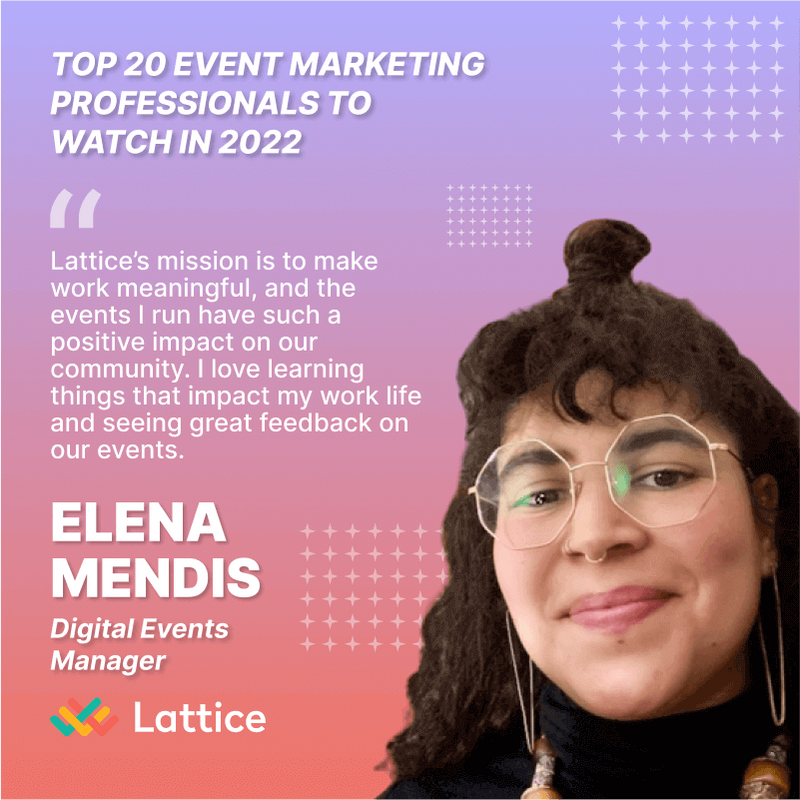
How did you get to this point in your career?
I started out working in publishing. I worked for Macmillan, a science textbook publisher, as an Executive Assistant. I later worked on the marketing side of things at Macmillan, helping out with their events.
From there, I moved into tech as the only events person for a small startup! We did a lot of events in those days to get our name out there. Since we were small fish amongst bigger players in our space, events were a really fruitful channel.
In the middle of the pandemic, I made the pivot to virtual events, and now I’m at Lattice running the digital events program!
What’s your favorite part about working in events?
I love getting to learn from and interact with such amazing people on a regular basis. Lattice’s mission is to make work meaningful, and the events I run have such a positive impact on our community. I love learning things that impact my work life and seeing great feedback on our events.
Aimee Moyer, Partner Marketing at Bolt
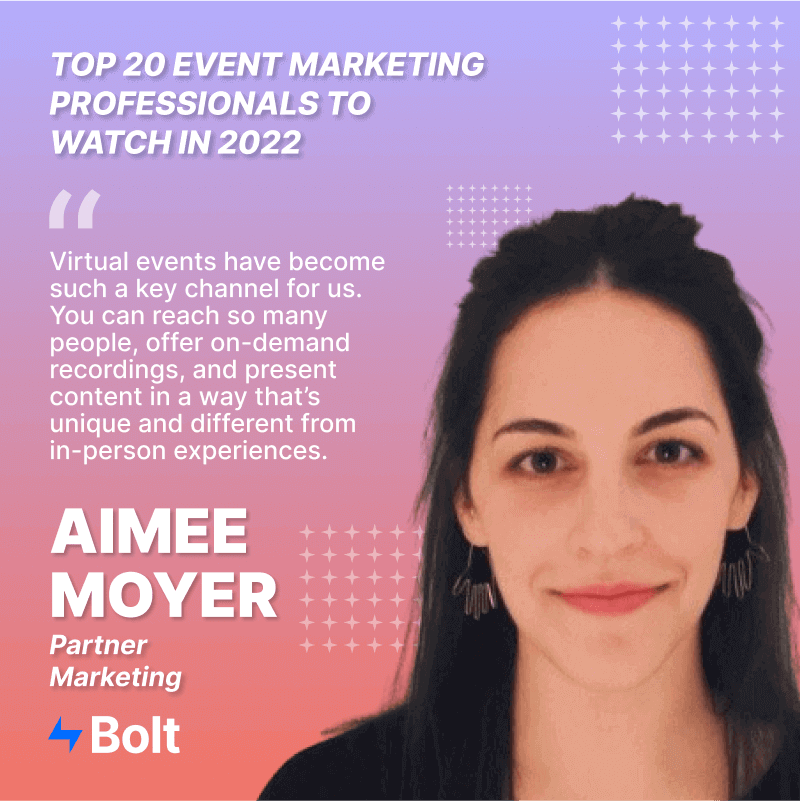
How did you get into event marketing?
I started my career in e-commerce and startups and then moved on to bigger companies, including AT&T. But, I eventually found my way back to a startup.
I just love the tenacity and spirit of startups—being scrappy and being able to make decisions without too much red tape. I found that when you allow yourself to say ‘yes’ and ‘no’ to the right things, you find yourself in a career that you’ve had control over.
Why are events important to your overall marketing strategy?
Events are an important place for folks to connect, learn, and interact. With the world finally opening up again, it’s clear that people are hungry for in-person interaction again.
In-person events are a great place to build brand awareness, network with peers, and have face-to-face conversations that are simply not possible with digital interactions.
Virtual events became such a key channel for us (and everyone) during the pandemic. You can reach so many people, offer on-demand recordings, and present content in a way that’s unique and different from in-person experiences.
So overall, the possibilities and goals for events are ever-growing, and I’m excited to see how it all turns out.
Rocio Pineda, Digital Community Manager at Reputation
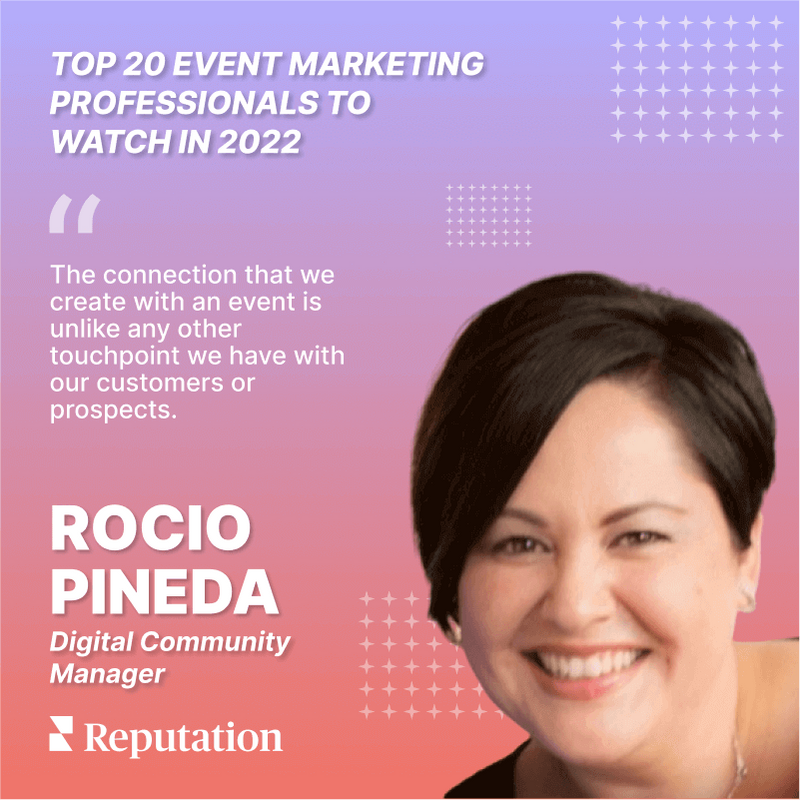
How did you get into event marketing?
As a theater arts major, I never would have thought that I would be where I am today professionally.
After dedicating 20 years of my career to nonprofits and private education, I found myself at a crossroads during the pandemic. I realized I needed to make a career change for the betterment of myself and my family.
After a long search, I found the perfect company that offered an amazing work-life balance and an opportunity to grow. It was a new field, and it truly challenged me. I was very fortunate to join the Reputation team in April of 2021 as their new Digital Community Manager.
As Reputation’s Digital Community Manager, my focus has been on spearheading the webinar program -- really identifying and forging relationships with third-party organizations to boost our brand awareness and emerge as a thought leader in CX.
Being a Reputation employee has been a wonderful experience, and I feel so blessed to have found such a wonderful place to work and call home.
Why are events important to your overall marketing strategy?
The connection that we create with an event is unlike any other touchpoint we have with our customers or prospects. Instead of us just talking to them through our website or piece of collateral, it is an opportunity for the conversation to go both ways.
Our platform is based on the importance of feedback. Whether we are in-person or virtual, the insight we gain from interactions at events is invaluable in creating a partnership with our customers.
Natalia Rybicka, Senior Director of Event Marketing at Attentive
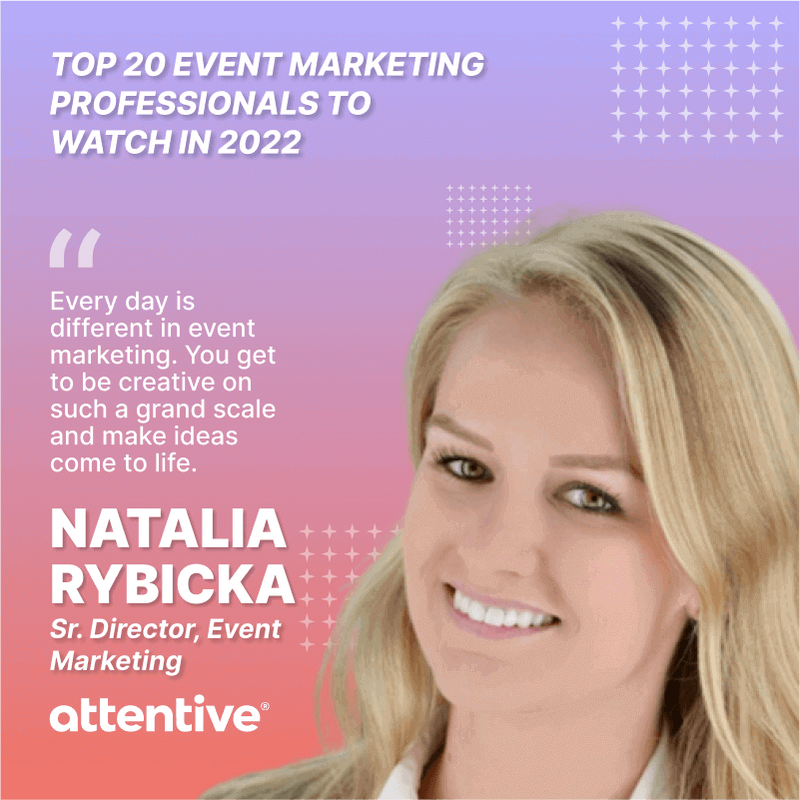
How did you get into event marketing?
The event marketing industry wasn’t something I was aware of entering the workforce. I initially focused on advertising. However, by sheer accident, I ended up as one of the first marketing employees in a tech company, and that’s where I found my passion.
With our team growing and tech industry events becoming a big marketing channel in the 2000s, I got the opportunity to step up and start the event marketing practice in my company.
I think that having a marketing generalist background has been core to my event marketing career path, as it allows me to understand how all channels co-exist and can be combined for an event marketing campaign.
What is your favorite part about working in events?
Every day is different in event marketing! You get to be creative on such a grand scale and make ideas tangible. I also love building communities, and events are the only channel rooted in relationships.
Sam Trieu, Event Marketing Manager at Axonify
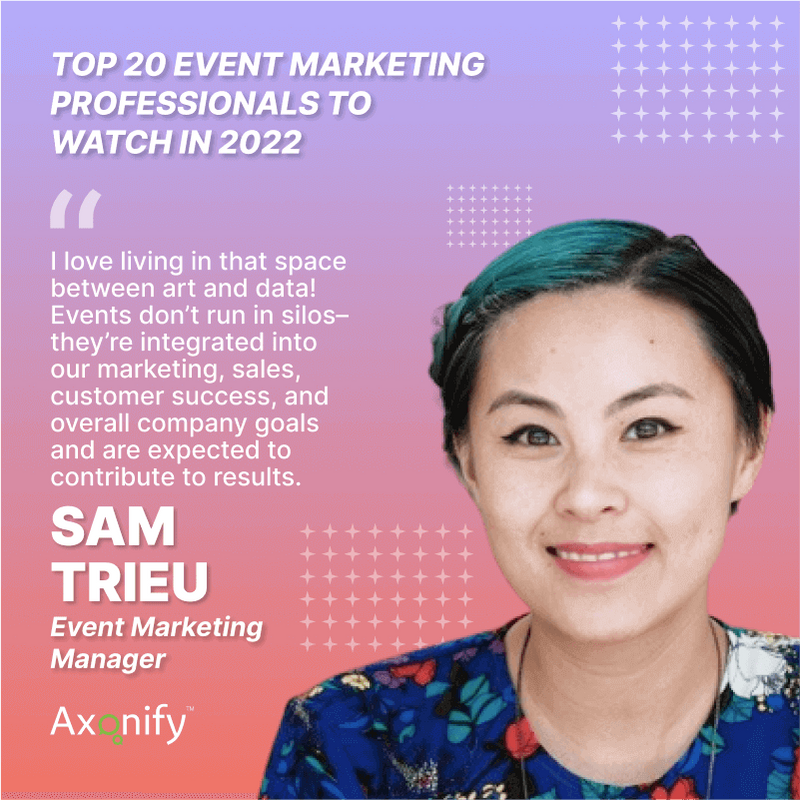
How did you get to this point in your career?
I’ve been privileged to be in the middle of the Waterloo Region tech (considered Silicon Valley North) ecosystem throughout my co-op, new grad, and seasoned salty mid-career times.
The opportunity to work on massive in-person user conferences, far-flung roadshows and tradeshows, plus virtual events across different time zones for prospects, customers, partners, and our own staff came from exposure to different company growth stages, industries, and brand needs. Experience has been a great teacher.
What’s your favorite part about working in events?
Living in that space between art and data! Events don’t run in silos–they’re integrated into our marketing, sales, customer success, and overall company goals and are expected to contribute to results. But a boring event is the death of us all, so balancing surprise and delight experiences with a clear line of sight to business goals is where my team thrives.
On that note: teamwork. Working with talented copywriters, designers, marketers, product teams, etc. makes the lift so much easier, focused, and fun!
Laura Vieiro Rial, Content Marketing Specialist at Logikcull
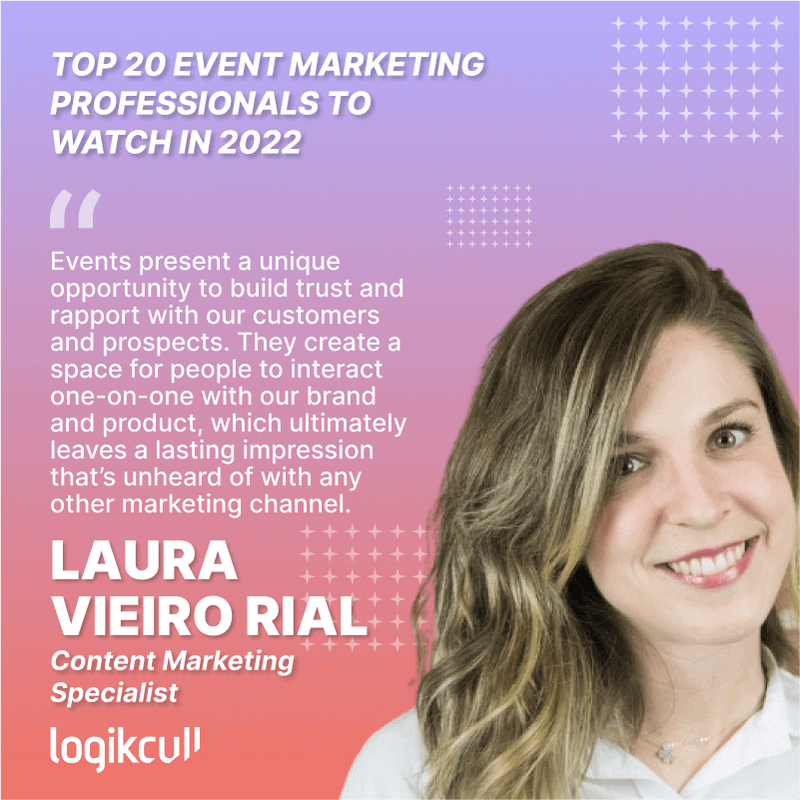
How did you get into content marketing and events?
My path to content and event marketing has been quite unorthodox.
My studies back at college focused on translation, interpreting, and foreign language teaching. I’m incredibly passionate about everything related to languages and communication. I actually began my career as a legal and medical translator and an English teacher.
Later, I decided to expand my skill set into the communications realm and studied for a Master’s degree in corporate communications management, which brought me into the exciting and ultra-creative world of B2B marketing.
Since I kicked off this new career path, I’ve always worked with B2B SaaS companies. First, as a Marketing Associate at Badger Maps and now as a Content Marketing Specialist at Logikcull.
My diverse background and hunger for new challenges have allowed me to succeed in these roles and bring new perspectives to the table, and I’m really excited for what lies ahead for me.
What’s your event strategy this year?
Logikcull has fully embraced a remote culture during the pandemic that, for now, also applies to all the events we organize.
InHouse 22, our annual user conference, is the next big event we’ll be hosting, and it will be 100% virtual. However, we plan to go back to in-person and hybrid events by 2023.
We do attend and sponsor multiple events where our target audience gathers, and those are usually a good mix of virtual and in-person.
My own prediction about the future of events is that hybrid events — as well as hybrid workplaces — are here to stay. While nothing will replace in-person events, as those are where the most genuine human connections happen, more and more prospects are expecting companies to enable remote access to their events so that they can attend from anywhere and at their own pace.
—
What an inspiring group of Event Marketers! Thank you all for your hard work bringing B2B events to life!

Transform Your Video Marketing with AI
Stay In Touch
Platform
Resources
Company
© 2026 Copyright Goldcast, Inc. All rights reserved.
YOUR PRIVACY CHOICES


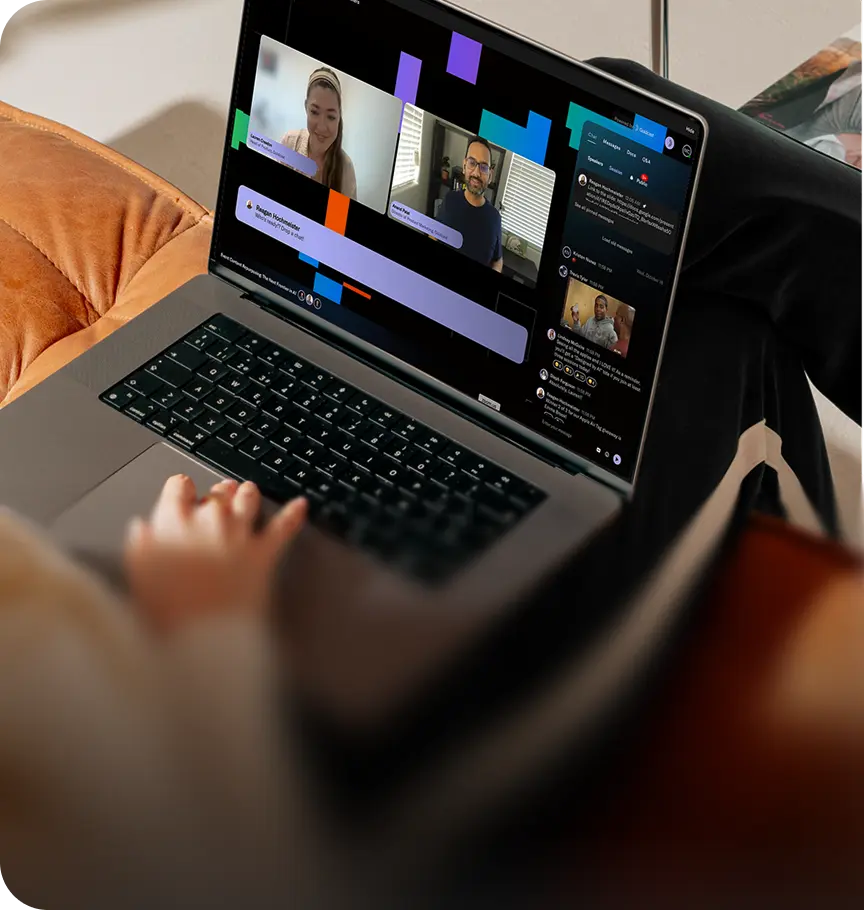

 Upcoming Events
Upcoming Events Event Series
Event Series On-Demand Events
On-Demand Events